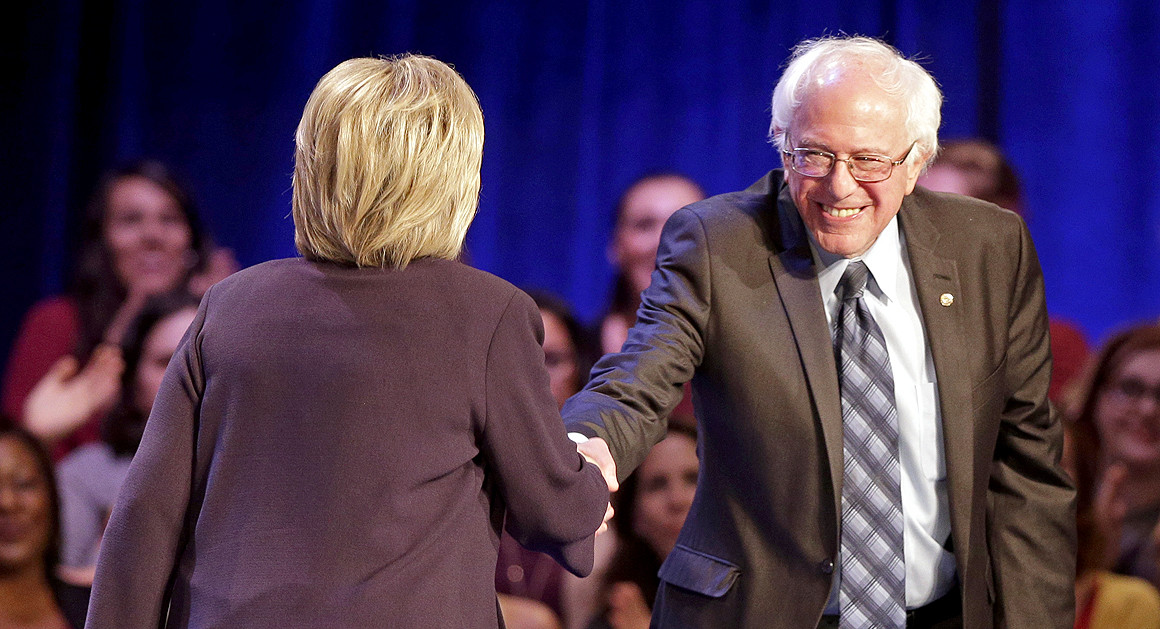
Hillary Clinton’s donors say they think Bernie Sanders will raise more money in the fourth quarter than their candidate for the first time ever — a testament to the underdog’s online cash juggernaut and a harbinger of donor fatigue among the front-runner’s backers.
Clinton campaign officials said she remains on track to reach her goal of $100 million for the primary by the end of the year; she had already collected $77 million by the end of the third quarter.
But Sanders nearly matched Clinton in the most recent quarter — raising an eye-popping $26 million to Clinton’s $28 million — and multiple fundraising sources on Clinton’s team told POLITICO they expect the Vermont senator to beat her when the next financial disclosures are filed on Jan. 30, just before the Iowa caucuses.
“People are feeling very complacent — and more reluctant to contribute — because they don’t take Bernie Sanders that seriously,” top Clinton donor Alan Patricof told POLITICO. “They look at the other side and think, how could anyone possibly back any one of them? The attitude of sensible people is that she's the only one who makes any sense.” None of the donors or campaign insiders POLITICO spoke with Monday disputed the notion that Sanders was on track to beat them in the end-of-year cash race.
Low-balling your candidate’s fundraising totals is a time-honored practice in presidential politics: If Clinton somehow manages to come out on top, her campaign can portray the quarter as exceeding expectations — no easy feat in a race where she is leading Sanders by 20 to 30 percentage points nationally.
But the concern appears to be real. Over the past few days, Clinton’s advisers have taken steps to stoke donor enthusiasm: Bill and Chelsea Clinton, who on Monday announced she is pregnant with her second child, have stepped up their fundraising for the campaign. They are expected to become even more involved in the campaign beginning in January.
And many of the donors POLITICO has interviewed over the last few months say the widespread perception that’s she’s a shoo-in is prompting would-be donors to remain on the sidelines — waiting to throw their financial support behind her for the only race they believe truly matters — the general election.
“Let Bernie outraise her — he’s not going to be the nominee,” a top donor said. “The idea that Donald Trump or Ted Cruz could actually be the president is going to be the greatest fundraising mechanism in the history of the world, and it’s just too early for that.”
A sign that Clinton’s donors are more eager to donate to a general election campaign than a primary they see as already in the bag was the success of the high-dollar Victory Fund event last week. There, donors wrote $32,400 checks that are split between the national and state Democratic parties.
Still, Sanders’ surge has less to do with a Clinton swoon — she’s raising cash at a respectable clip — than the Vermont independent’s wildfire appeal to small-money donors, which reminds many Clinton veterans of Barack Obama’s surprising fundraising prowess during the 2008 campaign.
For its part, Sanders’ campaign has been touting its large number of small contributions as a sign of the grass-roots power behind his candidacy. On Saturday, Sanders announced his campaign broke a record by bringing in more individual contributions than any presidential candidate in history — even topping the 2.2 million donations Obama received by the end of 2011 during his reelection campaign. Plus, Sanders’ team says it raised more than $1 million after the Democratic National Committee temporarily suspended the campaign’s access to its own voter files over a data breach last week.
Sanders campaign manager Jeff Weaver on Monday refused to comment on whether he expected to outpace Clinton’s fundraising by the end of the year.
While Sanders has been building up a grass-roots list of small donors who can be tapped and tapped again for donations throughout the campaign, Clinton’s team targeted its list of core supporters early and had many donors write the maximum checks of $2,700 months ago. “Those of us who snap to attention when she snaps her fingers — they tapped into that a long time ago,” said one top Clinton donor who has hosted a house party for the candidate.
But the campaign is aware that maxing out its donors early could become a long-term issue and is actively trying to court a new crowd. It has dispatched high-profile surrogates like former Obama campaign manager David Plouffe, former Secretary of State Madeleine Albright, political consultant James Carville and former Clinton aide Lisa Caputo to host “salons” — free events where they talk about the campaign and take questions from attendees, hoping to inspire fresh donor faces to become involved.
“This was part of a series of events with surrogates meant to encourage new raisers and donors to get involved in the campaign and grow our network,” a campaign official said of the free events.
Even if Clinton manages to make up lost ground between now and year’s end, Sanders’ success with grass-roots donors and Clinton’s dependence on the big-money contributors her opponent decries as out-of-touch plutocrats creates a PR problem for her campaign.
“About 3 percent of my donations come from people in the finance and investment world,” she said at Saturday’s debate, playing defense against Sanders’ charge that she is a tool of Wall Street. “I have more donations from students and teachers than I do from people associated with Wall Street.”
But the truth is, her campaign and the super PAC supporting her received $5.7 million from the securities and investments industry, out of $97.8 million total. That’s almost 6 percent. It’s closer to 3 percent if you only count fundraising by her official campaign. But in the context of a clash with Sanders, who doesn’t have an allied super PAC, it’s misleading to overlook hers.
- Publish my comments...
- 0 Comments
